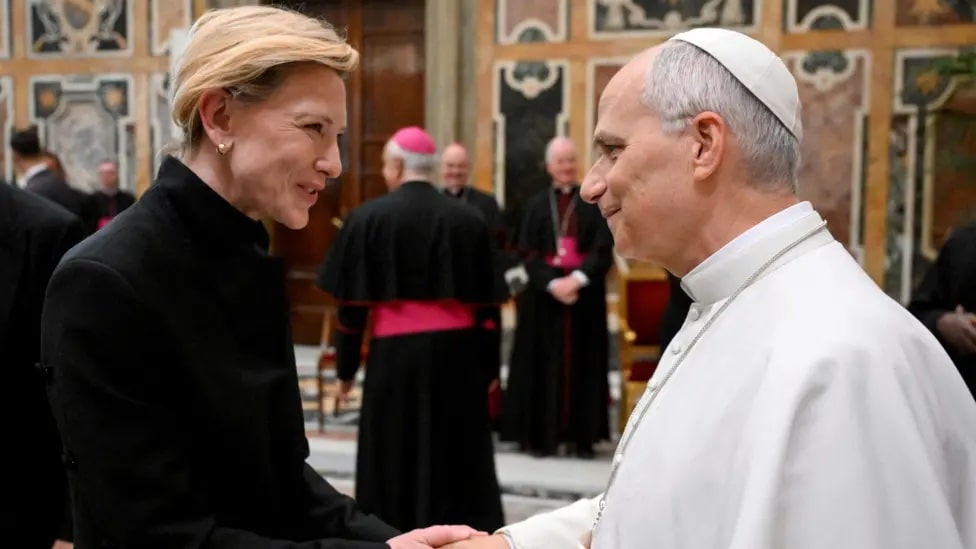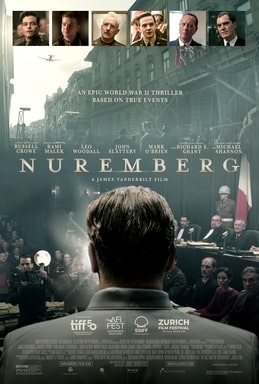
Sermon – Sunday 16th November 2025 – Thirty-third Sunday of Year C

“As for these things that you see, the days will come when there will not be left here one stone upon another that will not be thrown down.”
Pope Leo yesterday received in audience an array of Hollywood stars, whom he urged to continue their work as “pilgrims of the imagination,” helping to bring hope. He spoke of a “troubling decline” in cinema-going. For once I’ve got with the programme! As an avid cinema-goer myself I feel vindicated, and the Holy Father praised the big screen’s “capacity to amaze.” So, if you are looking for some relief from the damp, cold, gloom of November, you might consider going to see The Choral at the pictures. From the moment that it begins, it is clear that it will be identical to every other film or play written by Alan Bennett, with the same jokes, the same anachronistic social commentary, and the same comforting, northern cosiness, in spite of the drama being set in 1916. But an interesting feature for us, is that there is an off-screen character – that of our Cardinal, St John Henry Newman.

Set in a fictional mill town, the film follows the auditions and rehearsals of the local choral society, whose choir master has been inconveniently called up to fight on the western front. The local musical grandees have to find a replacement, and despite their reservations – he has lived in Germany – they appoint Dr Guthrie, played by Ralph Fiennes. He jettisons Bach’s St Matthew Passion after a rock is thrown through a window during rehearsals by someone who disapproves of this German music being performed, even in English. Instead, he suggests singing The Dream of Gerontius by Sir Edward Elgar. Elgar gives his permission, though when he turns up on the day of the performance, atop a Rolls Royce, wearing the robes of a Doctor of Music, he turns out to be a lecherous, pompous monster – rather unfair on the actual Elgar I feel, though Simon Russell Beale’s burlesque performance is highly entertaining.
There is however, some consternation among the town worthies when they realize that not only is Elgar a Roman Catholic – and his delay in replying is put down to typical Catholic fecklessness – but that the text of the Dream of Gerontius was written by Cardinal Newman. The vicar, in particular, feels obliged to point out forcefully that the Church of England is quite clear, there is no Purgatory. The tenor solo, played by Jacob Dudman, who has returned from the front minus his right arm, gives an impassioned and rather too polished account of the Purgatory he has experienced in the trenches, and the religious elements of the Dream are sidelined, in favour of a secular account of suffering and redemption. This is one of the things which the unpleasantly Catholic Elgar makes such a fuss – when told that the choral society has made the text less religious, he remarks acidly, “It’s religious because it’s a poem by Cardinal Newman.”

And what a poem! Elgar’s musical interpretation punctuates the screenplay, and we are reminded of that awful encounter each one of us shall have with death. In today’s Gospel, our Lord warns us that war, conflict, and disaster will be features of human life right up until the end of the world:
“Nation will rise up against nation, and kingdom against kingdom. There will be great earthquakes, and in places terrible famines and pestilences. And there will be terrors and great signs from heaven.”
Not a cheerful picture, we might think, and yet in all the tribulations of life comes our opportunity to bear witness to the truth of Christ. In the Dream of Gerontius, Gerontius, as his name suggests, is an old man facing death and judgement. We hear him praying on his deathbed, “Be with me Lord, in my extremity!” and we hear the priest and the man’s friends asking the intercession of the angels and saints for him: “Be merciful, be gracious; spare him, Lord.” Gerontius dies, and then meets his guardian angel, who gives thanks to God that he has safely conducted this soul entrusted to him to salvation:
“My Father gave
In charge to me
This child of earth
E’en blind from its brith,
To serve and save,
Alleluia,
And saved is he.”
By contrast, the demons try to wrest Gerontius’ soul away:
“Low-born clods
Of brute earth,
They aspire
To become gods,
By a new birth.”
The demons are powerless against God’s power, but in the judgement upon him, Gerontius learns that he must endure the pains of Purgatory before he can contemplate the vision of God. Yes, Purgatory does exist:
“A double debt he has to pay –
The forfeit of his sins,
The chill of death is past, and now
The penance-fire begins.”
Gerontius goes willingly to his suffering:
“Take me away, and in the lowest depth
There let me be,
And there in hope night-watches keep,
Told out for me.”
And the angel bids him farewell, in one of the most famous of Elgar’s setting of Newman’s words:
“Farewell, but not for ever! Brother dear,
Be brave and patient on thy bed of sorrow;
Swiftly shall pass thy night of trial here,
And I will come and wake thee on the morrow.”

Death, judgement, heaven, and hell. The four last things. These were uncomfortable facts for the fictional inhabitants of The Choral to dwell upon, and they are often pushed from our minds too. But they come to us all, whether we are Gerontius, the old man who has lived a full life, or the appallingly-young victims of the Battle of the Somme. When our Lord’s disciples viewed the noble stones of the temple, they were in awe, and understandably so. Josephus, the first-century Jewish historian, tells us that some of the stones used to build the Temple were sixty feet in length – and they weighed over 500 tons. Josephus writes,
“The gate opening into (the temple) was completely overlaid with gold, as was the whole wall around it. It had above it golden vines from which hung grape clusters as tall as a man; and it had golden doors fifty-five cubits high (c80’) and sixteen broad (c24’). Before these hung a veil of equal length in Babylonian tapestry, with embroidery of blue and fine linen, of scarlet also and purple, wrought with marvellous skill.”
The forty-foot-high columns that supported the cedar-panelled roof each would take three men with outstretched arms to envelop it. No wonder that the disciples were impressed. The building of the temple must have seemed to be the most solid, most permanent structure in the whole world, especially to provincials coming in from Galilee. But Jesus is not impressed:
“As for these things that you see, the days will come when there will not be left here one stone upon another that will not be thrown down.”
In AD 70, the Romans destroyed the Temple, and the whole city of Jerusalem so completely that not one stone was left upon another – only the supporting wall of the temple, the Western Wall now remains. Even the name of Jerusalem was erased, so that it became Aelia Capitolina. When we put our trust in anything except Jesus, we will be disappointed. It will pass away. All that is most impressive, or terrifying, now is temporary. The truths that we find in the Gospel, the truths about which our Cardinal writes in the Dream of Gerontius, these only are what endure.
For each one of us, there will come that moment when our soul will be separated from our body, and we will appear before the Majesty of the divine throne to give an account of our lives. “The Lord comes to judge the people with fairness.” There we can trust in nothing but the mercy of God, and it is only by clinging to Him that we can be assured of life:
“But not a hair of your head will perish. By your endurance you will gain your lives.”

There is another new film released this week, which also made me think of John Henry Newman, though it does not refer to him directly. The film is Nuremberg and it deals with the trials that took place in 1946 of Hermann Göring (played brilliantly by Russell Crowe) and other members of the Nazi High Command for crimes against humanity. At Nuremberg, Adolf Hitler built the largest stadium in the world, where the huge rallies were held, and where in 1935 the infamous racial laws were enacted. Anyone going to Nuremberg during the time of Nazi rule must have felt themselves to be in the presence of an invincible, colossal, power. And that’s why is was deemed necessary to put the surviving perpetrators of the Holocaust and other atrocities on trial in Nuremberg, to show that, as a character in the film says, “This war ends in a courtroom.” But before the Nuremberg trials, nobody had ever used international law to prosecute those who were acting legally according to the jurisdiction in which they lived. The idea of holding people responsible for crimes against humanity was a new idea, meant to prevent anything so awful from ever happening again. “Behold, the day is coming…when all the arrogant and all evil doers will be stubble.”
Yet there have been plenty of crimes against humanity committed since the 1940s, and one of the reasons for that, as the film Nuremberg shows, is that the concept of such a crime is defined in a purely secular way. But where in fact does our sense of right and wrong come from? Is there really a universal standard of morality that can be applied? And this, I would say, is where our new Doctor of the Church comes in. Newman said that conscience is the “aboriginal Vicar of Christ”. In other words, each one of us has the divine voice speaking within us, that commands us to act in certain ways, and forbids us from acting in others. We are responsible for our actions, and we can be held accountable for them. The state of the world as it is, is at least partly because of the way in which we have behaved. The reason that, like Gerontius, we will have to spend time in Purgatory, is so that we can atone for the damage that we have done to ourselves and others by sin. There are consequences attached to everything that we do. And there is a Judge, who will deliver us from punishment only according to the merits of our Crucified Lord:
“O happy, suffering soul! for it is safe,
Consumed, yet quickened, by the glance of God.”
In these last days of the liturgical year, the Church presents to us these apocalyptic passages from the scriptures so as to remind us of the real purpose of our lives, and to awaken within us the voice of conscience, which calls us to repentance, to change, and to encourage us in the Lord Jesus Christ to live with our eyes fixed upon the real life which is to come. In the words of the Dream of Gerontius:
“Rouse thee, my fainting soul, and play the man;
And through such waning span
Of life and thought as still has to be trod,
Prepare to meet thy God.
And while the storm of that bewilderment
Is for a season spent,
And, ere afresh the ruin upon thee fall,
Use well the interval.”